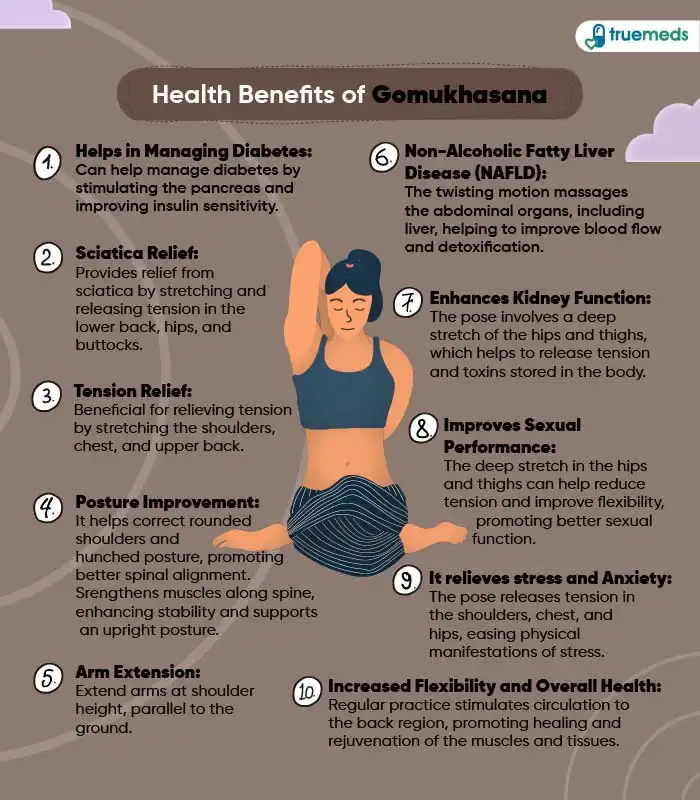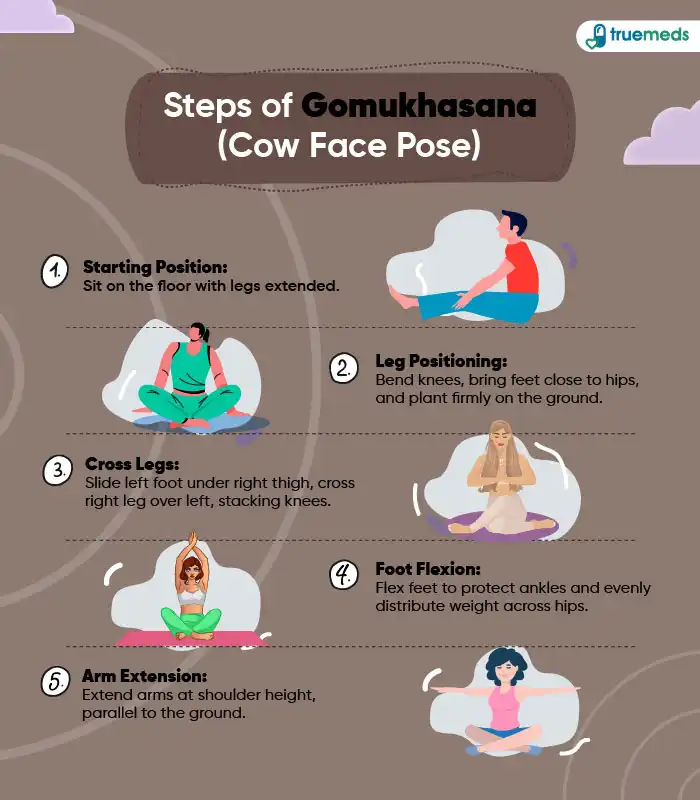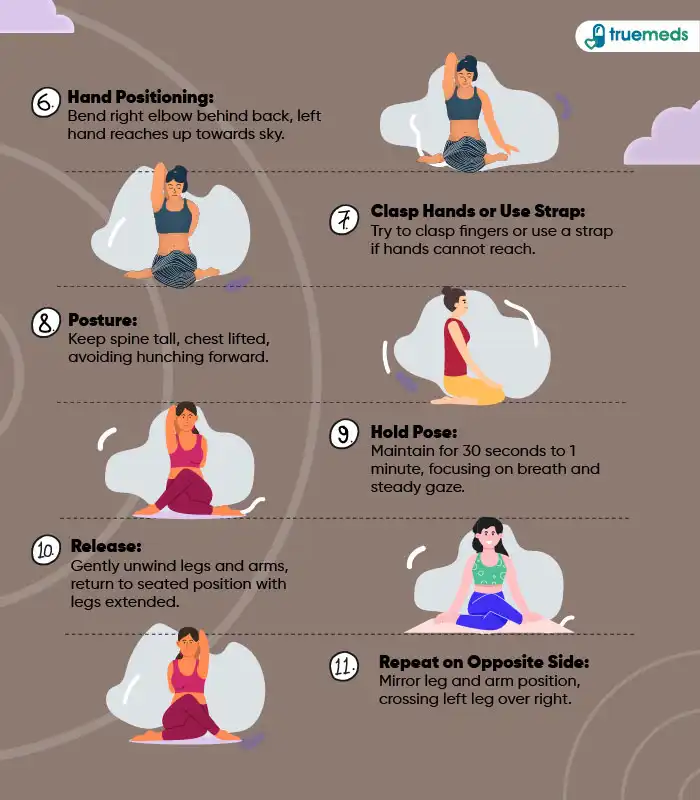Gomukhasana (Cow Face Pose) – Step-by-Step Guide, Benefits and Precautions
Last updated on : 25 Feb, 2025
Read time : 13 min
Yoga teaches us how to live a healthy life by improving our concentration, flexibility, creativity, brain activity and memory. It helps us stay physically and mentally healthy, especially in today’s busy world where stress is common. Yoga can prevent emotional instability and improve muscle strength, stamina, and mental stability. Gomukhasana, or cow face pose, is a seated yoga posture that stretches many body parts simultaneously, including the ankles, hips, thighs, shoulders, underarms, triceps, and chest.
Keep reading to learn more about this asan, Gomukhasana procedure, and its benefits.
What is a Gomukhasana (Cow Face Pose)?
Gomukhasana, or cow face pose, is a yoga posture that involves intertwining the arms behind the back while seated. This pose is named as such because when performing the pose, the legs and arms resemble the face of a cow. The crossed legs represent the mouth of the cow, while the raised arms represent the ears. This visual resemblance to the face of a cow led to the pose being named the cow face pose in yoga.
This pose primarily benefits the shoulders, chest, arms, hips, and thighs. It stretches the shoulders and chest muscles, improving flexibility and relieving tension. Additionally, it opens up the hips, promoting mobility and alleviating stiffness. Gomukhasana also engages the muscles of the arms and upper back, enhancing strength and stability. It is often practised as part of a yoga sequence aimed at improving posture, relieving stress, and enhancing overall body awareness. Gomukhasana can be performed at any time during a yoga practice. It can be done post-dinner as well. However, this pose is particularly beneficial for relieving tension after prolonged sitting or physical activity.
Benefits of Gomukhasana

Besides stretching and improving flexibility, here are some other Gomukhasana benefits include:
1) Helps in Managing Diabetes
Gomukhasana, or cow face pose, can help manage diabetes by stimulating the pancreas and improving insulin sensitivity. The stretching involved in the pose can also aid in regulating blood sugar levels. Additionally, Gomukhasana promotes relaxation and reduces stress, which can contribute to better blood glucose control. Regular practice of this pose, along with proper diet and lifestyle changes, may benefit diabetics.
2) Sciatica Relief
Gomukhasana can provide relief from sciatica by stretching and releasing tension in the lower back, hips, and buttocks. It helps to reduce compression on the sciatic nerve and improves flexibility in the spine. Regular practice of Gomukhasana as part of Sciatica Exercises may reduce pain and discomfort associated with sciatica while promoting overall spinal health and mobility.
3) Tension Relief
Cow face pose, is also beneficial for relieving tension by stretching the shoulders, chest, and upper back. It helps release tightness in the muscles and promotes relaxation. Practising Gomukhasana regularly can reduce stress and anxiety while improving overall flexibility and posture.
4) Posture Improvement
Gomukhasana aids in improving posture by stretching and opening the chest, shoulders, and upper back muscles. It helps correct rounded shoulders and hunched posture, promoting better spinal alignment. Regular practice of Gomukhasana strengthens the muscles along the spine, enhancing stability and support for a more upright posture. Additionally, the pose encourages awareness of body alignment, encouraging mindfulness in everyday activities.
5) Backache Relief
This yoga offers relief from backaches by stretching the spine and relieving tension in the lower back muscles. It helps improve flexibility and mobility in the spine, reducing stiffness and discomfort. Regular practice of Gomukhasana strengthens the muscles supporting the spine, providing better support and stability. Additionally, the pose promotes relaxation and releases tension in the back, easing pain and promoting overall spinal health.
6) Non-Alcoholic Fatty Liver Disease (NAFLD)
Gomukhasana, or cow face pose, also aid in managing Non-Alcoholic Fatty Liver Disease (NAFLD) by promoting digestion and stimulating liver function. The twisting motion involved in the pose massages the abdominal organs, including the liver, helping to improve blood flow and detoxification. Regular practice of Gomukhasana also supports weight management, which is beneficial for reducing fat accumulation in the liver. Additionally, the pose encourages relaxation and reduces stress, which can indirectly benefit liver health by promoting overall well-being.
7) Enhances Kidney Function
This yoga pose, aids in enhancing kidney function by improving blood circulation and stimulating the kidneys. The pose involves a deep stretch of the hips and thighs, which helps to release tension and toxins stored in the body. Regular practice of Gomukhasana also promotes overall relaxation and reduces stress, which can benefit kidney health. Additionally, the pose encourages proper alignment of the spine and supports the optimal functioning of the urinary system, contributing to improved kidney function over time.
8) Improves Sexual Performance
Gomukhasana, or cow face pose, can enhance sexual performance by increasing blood flow to the pelvic region and stimulating reproductive organs. The deep stretch in the hips and thighs can help reduce tension and improve flexibility, promoting better sexual function. Additionally, the pose can reduce stress and anxiety, which are common factors contributing to sexual dysfunction. Regular practice of Gomukhasana can improve overall physical stamina and vitality, leading to enhanced sexual performance and satisfaction.
Also Read: Reduce Anxiety by Mindfulness
9) Relieves Stress and Anxiety
Cow face pose helps relieve stress and anxiety by promoting relaxation through deep breathing and stretching. The pose releases tension in the shoulders, chest, and hips, easing physical manifestations of stress. By calming the mind and body, Gomukhasana yoga reduces cortisol levels and promotes a sense of tranquillity and well-being. Regular practice of this pose can enhance mental clarity, resilience, and overall emotional balance, making it an effective tool for managing stress and anxiety.
10) Increased Flexibility and Overall Health
This pose also helps reduce backache by stretching and strengthening the spine, hips, and shoulders. It improves flexibility and mobility in the back muscles, relieving tension and discomfort. Regular practice of this pose enhances overall spinal health and posture, reducing the likelihood of future backaches. Additionally, Gomukhasana stimulates circulation to the back region, promoting healing and rejuvenation of the muscles and tissues.
Read Also: Health Benefits of Vajrasana
What are the Steps of Gomukhasana (Cow Face Pose)?


Incorporating Gomukhasana yoga into your routine can promote relaxation, focus, and mental clarity. Here’s are simple Gomukhasana steps.
- Start by sitting on the floor with your legs stretched out in front of you.
- Bend your knees and bring your feet closer to your hips, ensuring they are firmly planted on the ground.
- Slide your left foot under your right thigh, beside your right hip.
- Cross your right leg over your left, stacking your right knee directly on top of your left knee.
- Try to align both knees as closely as possible, with one directly on top of the other.
- Flex your feet to protect your ankles and distribute the weight evenly across both hips.
- Extend your arms to the sides at shoulder height, parallel to the ground.
- Bend your right elbow and reach your right hand behind your back, palm facing away from your body.
- Bend your left elbow and reach your left hand up towards the sky, palm facing your back.
- Try to clasp your fingers together or hold onto a strap if your hands cannot reach each other.
- Keep your spine tall and your chest lifted, avoiding rounding or hunching forward.
- Hold the pose for 30 seconds to 1 minute while focusing on your breath and maintaining a steady gaze.
- To release, gently unwind your legs and arms, returning to a seated position with your legs extended.
- Repeat the pose on the opposite side, crossing your left leg over your right and mirroring the arm position.
Read Also: Health Benefits of Shashankasana (Rabbit Pose)
Warm-up Exercises Before Gomukhasana
Before practising Gomukhasana, it’s essential to warm up the body with preparatory poses that focus on opening the hips and shoulders. Here are some recommended warm-up poses:
- Sun Salutation (Surya Namaskar): Start with 10 rounds of Sun Salutations to open up the arms, shoulders, and lower back. The flowing sequence of movements, coordinated with deep breathing, prepares the body for the deeper stretches of Gomukhasana.
- Bound Angle Pose (Baddha Konasana): Sit on the floor with the soles of your feet together and your knees bent out to the sides. Hold onto your feet with your hands and elongate your spine as you inhale. Exhale to gently press the knees towards the floor, feeling the stretch in the inner and outer thighs. This pose helps to open up the hips and thighs, making it easier to get into Gomukhasana.
- Bow Pose (Dhanurasana): Lie on your stomach and bend your knees, bringing your heels towards your buttocks. Reach back and hold onto your ankles. Inhale to lift your chest and thighs off the floor, creating a bow shape with your body. This pose stretches the shoulders, chest, and legs, preparing them for the demands of Gomukhasana yoga.
By incorporating these warm-up poses into your practice routine, you can ensure that your body is adequately prepared for the challenges of Gomukhasana.
What are the Safety and Precautions of Gomukhasana?
Gomukhasana, or cow face pose, offers numerous benefits for the body, but it’s essential to practice it with care and attention to safety. Here are some safety tips and precautions to keep in mind:
- Warm-up: Always begin your practice with gentle warm-up poses to prepare your body for the deeper stretches of Gomukhasana. This helps to prevent injuries and allows for greater flexibility during the pose.
- Alignment: Pay attention to proper alignment during the pose to avoid strain on the joints and muscles. Keep your spine straight and shoulders relaxed, and ensure your knees and feet are correctly aligned.
- Gradual progression: If you’re new to Gomukhasana yoga or have tight hips or shoulders, start with modified versions of the pose or use props like blocks or straps to support your body. Gradually work towards deaeper variations as your flexibility improves.
- Avoid overexertion: Listen to your body and avoid pushing yourself too hard in the pose. If you feel any pain or discomfort, gently release the pose and rest. Avoid forcing your body into a position that feels uncomfortable.
- Breathing: Maintain smooth and steady breathing throughout the pose to promote relaxation and ease. Avoid holding your breath or straining during the pose.
By following these safety guidelines and practising mindfulness, you can enjoy the benefits of Gomukhasana while minimising the risk of injury.
Risks of Gomukhasana
While Gomukhasana yoga (cow face pose) offers numerous benefits, there are some risks associated with the pose that you should be aware of. These include:
- Injury and Surgery: Individuals with a history of shoulder, hip, knee, or back injuries or those who have undergone recent surgery in these areas should approach Gomukhasana with caution.
- Weak Body: If you are physically weak or have weak muscles, particularly in the shoulders, hips, or knees, you should exercise caution when practising Gomukhasana.
- Medical conditions: If you have pre-existing conditions of peptic ulcer, hernia, enlarged liver or having any surgery in the abdominal region, you should not practise this pose.
- Joint pain: The pose involves deep stretches that may exacerbate existing joint pain or injuries.
- Muscle cramps: Holding the pose for an extended period without proper warm-up or preparation can lead to muscle cramps or spasms.
- Pressure on nerves: Improper alignment during this posture or excessive force can put pressure on nerves, leading to discomfort.
Takeaway
Gomukhasana is a beneficial asan for diabetes, sciatic pain, backache, and non-alcoholic Fatty Liver. This pose also relieves tension, improves posture, enhances kidney function and improves sexual performance. With the numerous benefits of this pose for physical and mental well-being, it’s crucial to approach the pose with caution, especially for individuals with injuries, muscle or joint pain or specific health issues. By following the appropriate precautions, such as consulting a doctor, listening to the body’s signals, and practising mindfulness during the pose, you can avoid injuries and maximise the benefits of Gomukhasana. You can also explore more about healthy foods and diet tips for diabetes, muscle and joint pain, back pain, improved sexual performance and medicines to manage these conditions at Truemeds’ online pharmacy.
Frequently Asked Questions (FAQs)
Gomukhasana helps reduce symptoms associated with respiratory ailments like asthma and bronchitis by improving lung function and promoting better breathing patterns.
Yes, Gomukhasana can be practised during periods to reduce menstrual discomfort and promote relaxation, but it’s essential to listen to your body and avoid overexertion.
Individuals with shoulder or hip injuries, recent surgeries, or limited mobility should avoid Gomukhasana. Pregnant women should also avoid this pose, especially in the later stages of pregnancy, unless cleared by a healthcare professional.
Yes, Gomukhasana, or cow face pose, offers numerous health benefits, including improved flexibility, posture, and relief from stress and anxiety. However, it’s essential to practice it safely and with proper guidance to avoid injury and maximise its benefits.
Gomukhasana stimulates the kidneys, liver, and pancreas, aiding in digestion and metabolism regulation. It also stretches the chest, shoulders, and hips, promoting better posture and respiratory function.
You should hold Gomukhasana (Cow Face Pose) for 30 seconds to 1 minute on each side. Ensure you maintain steady breathing and focus on relaxing into the pose to maximize its benefits.
Common mistakes in Gomukhasana include rounding the back, not aligning the knees correctly, and straining the shoulders. It’s important to keep the spine straight, stack the knees properly, and gently stretch the shoulders without forcing them.
Beginners can modify Gomukhasana by sitting on a folded blanket or block to elevate the hips, making it easier to stack the knees. They can also use a strap to bridge the gap between the hands if they can’t clasp them together behind the back.
Yes, Gomukhasana can help with back pain by stretching and opening the shoulders, chest, and hips, which can alleviate tension in the upper and lower back. Maintaining a straight spine during the pose also promotes better posture.
Gomukhasana improves hip flexibility by deeply stretching the hip rotators and gluteal muscles. The pose encourages external rotation of the hips and opens the hip joints, enhancing overall flexibility and mobility in the hip area.
Disclaimer
Our healthcare experts have carefully reviewed and compiled the information presented here to ensure accuracy and trustworthiness. It is important to note that this information serves as a general overview of the topic and is for informational purposes only. It is not intended to diagnose, prevent, or cure any health problem. This page does not establish a doctor-patient relationship, nor does it replace the advice or consultation of a registered medical practitioner. We recommend seeking guidance from your registered medical practitioner for any questions or concerns regarding your medical condition.
Popular Articles
Recommended Articles
Recent Articles
Top-Selling Medicines:
...View more
Top-Selling OTC:
...View more
Subscribe
Registered Office Address
Grievance Officer
Download Truemeds

Contact Us
Our customer representative team is available 7 days a week from 9 am - 9 pm.
v3.5.16
Our Payment Partners


























































